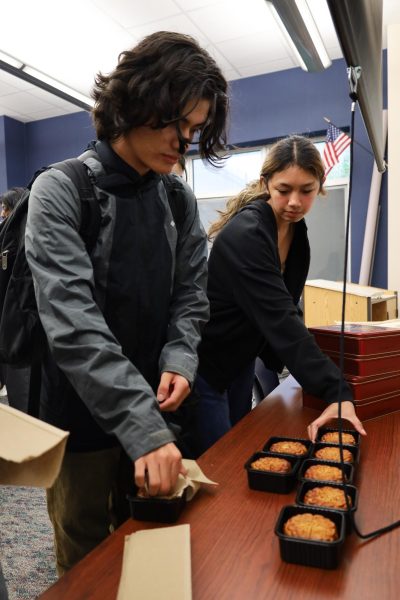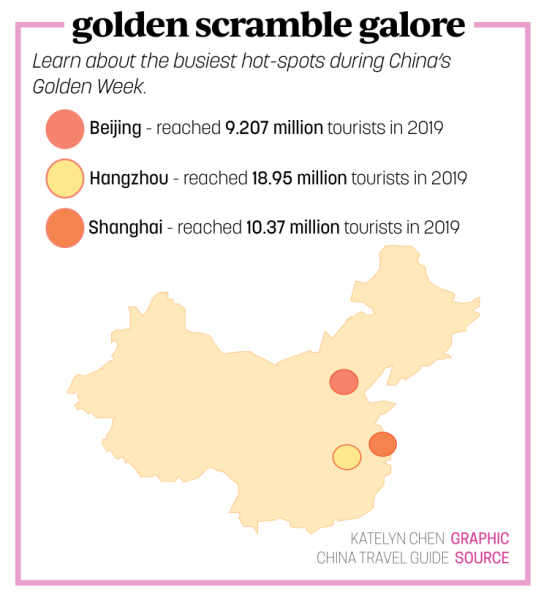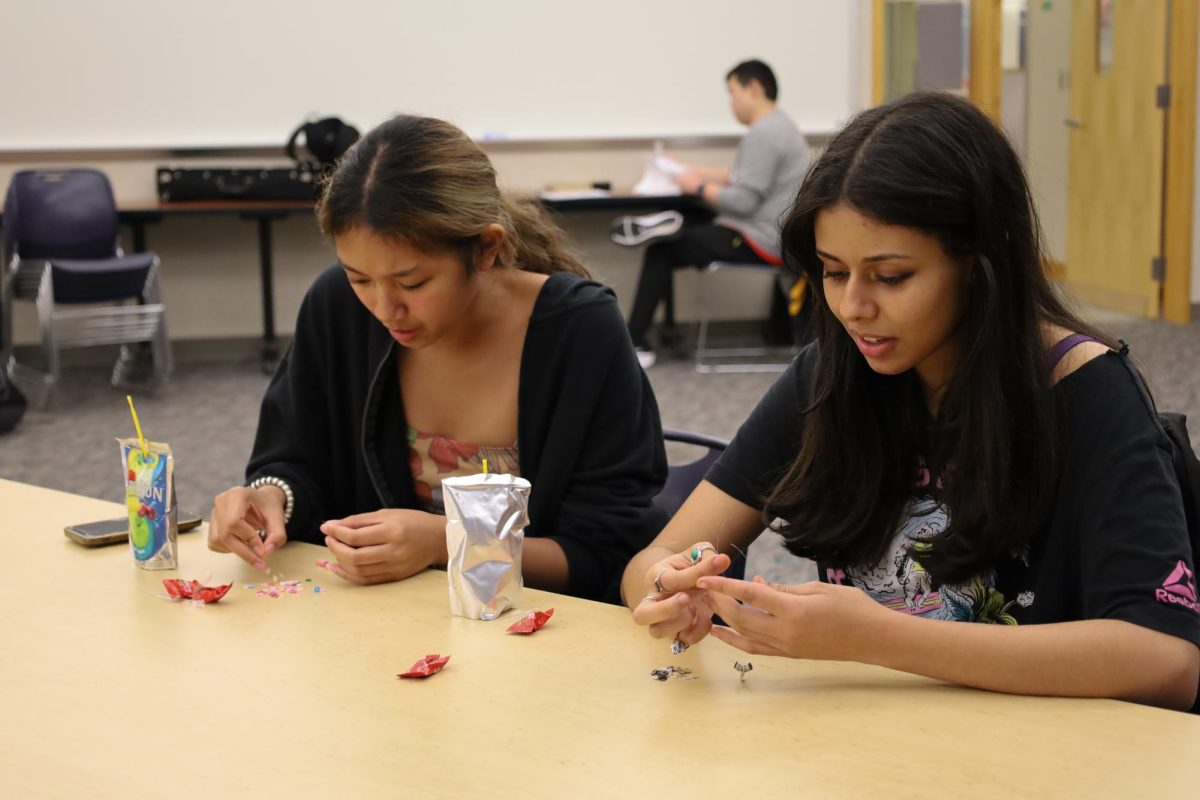Chinese Golden Week is the celebration of forming the People’s Republic of China. While the extended holidays were created to boost the Chinese economy, citizens usually celebrate by traveling, spending time with family and friends, or watching celebrations and military parades. The holidays showcase many values commonly seen in Chinese culture and heritage. Although these celebrations are more widespread in China, Chinese Americans often find ways to honor these customs from afar, like sophomore Chelsea Meng.
“I celebrate a lot of Chinese holidays, like Chinese New Year and the Mooncake Festival because it’s been a part of my life since I grew up in China,” Meng said. “…Every year we call family back in China, and do the traditions.”
Chinese teacher Tungfen Lee said many Chinese-American communities actively celebrate cultural practices.
“Chinese Holidays are often maintained through community events. In Carmel, we have the Mooncake Festival for our Mid-Autumn Festival holiday, and we will also celebrate Lunar New Year in our community,” she said.
Senior Jessica Ding said one of her favorite holidays is Children’s Day, which is in June. The day is set aside to acknowledge the importance of youth in China.

“It’s a time which honors the youth of the country. They get to celebrate and they usually get gifts,” Ding said. “I care about Children’s Day because of the cultural significance, but also because my parents always cut me a lot of slack on Children’s Day or that weekend.”
Meng said she struggled with moving to the U.S. at first, but she said she eventually adjusted.
“I was actually born in China, and I moved here when I was really young. I’d never felt really included because I was a different nationality,” Meng said. “But then as I grew up, I slowly picked up English and felt like I actually belonged with the other kids.”
Lee moved to the United States after growing up in Taiwan.
“I came to America to pursue an advanced degree in North Carolina, at Chapel Hill,” Lee said. “Later we became citizens, settled down here, and raised our family.”
Ding said growing up in America required her to learn to balance both identities.
“Growing up as a Chinese American means that I kind of had to balance the cultural practices and values of Chinese culture while living in American society,” Ding said.
Meng said she balances her identity by spreading awareness at events.
“I do community service and Chinese dancing. I’ve tried to perform for American festivals, but haven’t really adapted anything,” Meng said.
Lee said she educates students on Chinese heritage and culture.
“Cultural values are influenced by what we hear and see in our daily life, and then we pass them down from generation to generation,” Lee said.
Ding shared she feels Asian Americans have some additional challenges.
“Here in America, there’s a very high achieving culture, something that I see a lot of Asian American students also kind of have to face, which is that, they want to make their communities proud by being highly individualistic,” Ding said.
Meng said she has felt discriminated against in the past because of her appearance.
“During school, when I worked in groups, I realized that people kind of excluded me and they kind of made me do all the work,” Meng said.
Ding shared this sentiment, especially in school.

“Sometimes people assume I have fluency in a certain language, or they assume that I’m particularly strong in math when I’m not. I’m actually really bad at math,” she said, and added that media representation does play a large role in shaping public perception of Chinese Americans. “They [The media] don’t do enough research to properly, accurately portray the actual cultural values,” she said, “Often, it’s just an Asian American actor, and then their actual personality in the show is very much Americanized.”
Lee said culture can be tricky to teach to students who have not had much exposure to it.
“Filial piety is a cultural value very unique to the Chinese culture,” Lee said. “Many cultural values are influenced by what we hear and see in our daily life, and then we pass it down from generation to generation.”
Ding said she felt the same way, saying that Chinese and American cultures are very different.
“In China, it’s very much believed that you should make sacrifices in order to protect the community, which means sometimes limiting your personal development,” she said.
Lee shared her hopes for future generations of Chinese Americans who want to maintain their cultural heritage.
“The first one is I hope they can maintain their interest in learning the language,” she said. “Secondly, practicing their Chinese customs. The third one is passing them out to their future generations.”

































![AI in films like "The Brutalist" is convenient, but shouldn’t take priority [opinion]](https://hilite.org/wp-content/uploads/2025/02/catherine-cover-1200x471.jpg)









































![Review: “The Immortal Soul Salvage Yard:” A criminally underrated poetry collection [MUSE]](https://hilite.org/wp-content/uploads/2025/03/71cju6TvqmL._AC_UF10001000_QL80_.jpg)
![Review: "Dog Man" is Unapologetically Chaotic [MUSE]](https://hilite.org/wp-content/uploads/2025/03/dogman-1200x700.jpg)
![Review: "Ne Zha 2": The WeChat family reunion I didn’t know I needed [MUSE]](https://hilite.org/wp-content/uploads/2025/03/unnamed-4.png)
![Review in Print: Maripaz Villar brings a delightfully unique style to the world of WEBTOON [MUSE]](https://hilite.org/wp-content/uploads/2023/12/maripazcover-1200x960.jpg)
![Review: “The Sword of Kaigen” is a masterpiece [MUSE]](https://hilite.org/wp-content/uploads/2023/11/Screenshot-2023-11-26-201051.png)
![Review: Gateron Oil Kings, great linear switches, okay price [MUSE]](https://hilite.org/wp-content/uploads/2023/11/Screenshot-2023-11-26-200553.png)
![Review: “A Haunting in Venice” is a significant improvement from other Agatha Christie adaptations [MUSE]](https://hilite.org/wp-content/uploads/2023/11/e7ee2938a6d422669771bce6d8088521.jpg)
![Review: A Thanksgiving story from elementary school, still just as interesting [MUSE]](https://hilite.org/wp-content/uploads/2023/11/Screenshot-2023-11-26-195514-987x1200.png)
![Review: "When I Fly Towards You", cute, uplifting youth drama [MUSE]](https://hilite.org/wp-content/uploads/2023/09/When-I-Fly-Towards-You-Chinese-drama.png)
![Postcards from Muse: Hawaii Travel Diary [MUSE]](https://hilite.org/wp-content/uploads/2023/09/My-project-1-1200x1200.jpg)
![Review: "Ladybug & Cat Noir: The Movie," departure from original show [MUSE]](https://hilite.org/wp-content/uploads/2023/09/Ladybug__Cat_Noir_-_The_Movie_poster.jpg)
![Review in Print: "Hidden Love" is the cute, uplifting drama everyone needs [MUSE]](https://hilite.org/wp-content/uploads/2023/09/hiddenlovecover-e1693597208225-1030x1200.png)
![Review in Print: "Heartstopper" is the heartwarming queer romance we all need [MUSE]](https://hilite.org/wp-content/uploads/2023/08/museheartstoppercover-1200x654.png)




